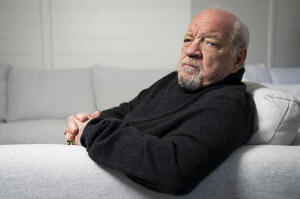Ex-assistant says filmmaker Paul Schrader sexually assaulted her and
backed out of settlement deal
[April 05, 2025]
By MICHAEL R. SISAK
NEW YORK (AP) — Paul Schrader, the writer of “Taxi Driver” and director
of “American Gigolo,” has been accused in a lawsuit of sexually
assaulting his former personal assistant, firing her when she wouldn't
acquiesce to advances and reneging on a settlement that was meant to
keep the allegations confidential.
The former assistant, identified in court documents as Jane Doe, sued
the filmmaker and his production company on Thursday. She is seeking a
judge's order to enforce the agreement after Schrader said he couldn’t
go through with it. The terms, including a monetary payment, were not
disclosed.
“This is an open-and-shut settlement enforcement matter,” Doe's lawyer,
Gregory Chiarello, wrote in court papers accompanying the breach of
contract claim.
Schrader's lawyer, Philip J. Kessler, deemed the lawsuit “desperate,
opportunistic and frivolous" and said many of the allegations in it are
false or materially misleading.
“We absolutely deny that there was ever a sexual relationship of any
kind between Mr. Schrader and his former assistant, and we deny that Mr.
Schrader ever made an attempt to have a sexual relationship of any kind
with his former assistant," Kessler said.
The lawsuit, filed in a New York court, laid bare allegations that the
confidential settlement between Doe, 26, and Schrader, 78, had been
intended to keep under wraps.

They include her claim that the filmmaker trapped her in his hotel room,
grabbed her arms and kissed her against her will last year while they
were promoting his latest film, “Oh, Canada,” at the Cannes Film
Festival in France.
Two days later, the lawsuit said, Schrader called Doe repeatedly and
sent her angry text messages claiming he was “dying” and couldn't pack
his bags. When Doe arrived to help, the lawsuit said, Schrader exposed
his genitals to her as he opened his hotel room door wearing nothing but
an open bathrobe.
Doe alleges Schrader fired her last September after she again rejected
his advances. Soon after, the lawsuit said, he sent her an email
expressing fear that he'd become "a Harvey Weinstein” in her mind.
Weinstein, the movie mogul turned #MeToo villain, was convicted of rape
in Los Angeles in 2022 and is awaiting an April 15 retrial in his New
York rape case.
According to the lawsuit, Schrader agreed to the settlement on Feb. 5
but changed his mind after an illness and “soul searching.” Schrader
conveyed through his lawyers last month that he “could not live with the
settlement,” the lawsuit said. Kessler disputed that.

[to top of second column]
|

Director Paul Schrader poses for a portrait for the film 'Oh,
Canada', at the 77th international film festival, Cannes, southern
France, May 17, 2024. (Photo by Scott A Garfitt/Invision/AP, File)
 “The agreement that they're trying
to enforce against Mr. Schrader, in plain English, required both
parties to sign it before it became legally effective,” Kessler
said. “Mr. Schrader declined to sign it. It's frankly as simple as
that.”
Doe worked for Schrader from 2021 until 2024, according to the
lawsuit. During that time, Kessler said, she posted on social media
about how much she loved her job and referred to Schrader as an
extraordinary mentor and “my man.”
Schrader rose to fame through his collaborations with director
Martin Scorsese, beginning with “Taxi Driver” in 1976. Robert De
Niro’s iconic line, “You talkin' to me,” is seared into the lexicon
and ranked among the American Film Institute’s all-time greatest
movie quotes.
Schrader co-wrote Scorsese's 1980 boxing drama “Raging Bull,” also
starring De Niro, and authored his 1988 religious epic “The Last
Temptation of Christ" and his 1999 paramedic drama “Bringing Out the
Dead.”
He's also directed 23 of his own films, highlighted by 1980’s
“American Gigolo,” which he also wrote. He received his only Academy
Award nomination for writing “First Reformed,” a 2017 thriller about
a small-town minister that he also directed.
Schrader told The Associated Press last year that he made “Oh,
Canada” — the film that Doe said brought them to Cannes — as he
reconciled his own mortality after a string of hospitalizations for
long COVID.
In 2016, Schrader told The Hollywood Reporter police visited him
after he ranted on Facebook about Donald Trump’s then-looming
presidency. Schrader wrote Trump’s election was “a call to violence”
and said people should be “willing to take arms.”
In 2023, he trashed the Oscars as scrambling "to be woke" with
diversity efforts and more international voters. And in 2021, in the
wake of #MeToo, he decried so-called “cancel culture," telling
Deadline it was “so infectious, it’s like the Delta virus.”
“If your friend says, ‘They’re saying these terrible things about me
that aren’t true’, you’re afraid to come to their defense, because
you might catch that virus too,” Schrader told the entertainment
news outlet.
All contents © copyright 2025 Associated Press. All rights reserved |